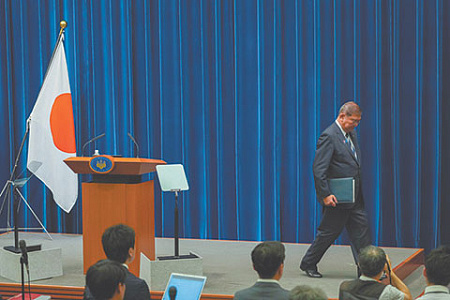
Japanese Prime Minister Shigeru Ishiba has confirmed his intention to step down, a move that threatens to plunge the nation’s political landscape into a period of significant uncertainty. At a press conference on Sunday, Ishiba officially framed his departure as a principled decision following the successful conclusion of difficult trade tariff negotiations with the United States. However, his resignation comes against a backdrop of a severe internal crisis within his ruling Liberal Democratic Party (LDP).
The true catalyst for the political shake-up appears to be a string of damaging electoral defeats that have eroded the LDP’s power base. The party and its coalition partner, Komeito, suffered critical losses in last year’s lower house elections and this year’s upper house contest, culminating in a failure to secure the Tokyo metropolitan assembly. This has cost the ruling coalition its parliamentary majority, forcing it into tenuous alliances with smaller opposition parties to pass legislation and drastically weakening its political mandate.
The turmoil within the LDP is so profound that nearly all of its high-ranking officials are reportedly planning to resign alongside Ishiba, creating a power vacuum and setting the stage for a fierce succession battle. According to Valery Kistanov, Head of the Center for Japanese Studies at the Russian Academy of Sciences’ Institute of China and Contemporary Asia, Ishiba is shouldering the blame for poor party leadership and the electoral routs. He noted that the Prime Minister also faced sharp domestic criticism over a trade deal with the US, where a verbal agreement for tariff reductions in exchange for $550 billion in Japanese investment was never formally documented.
Adding to the pressure, Ishiba’s government has been grappling with demands from the United States to dramatically increase its defense spending to 5% of GDP and pay more for the stationing of American troops. These demands are highly contentious in Japan, which has already committed to what many consider a burdensome goal of raising military expenditure to 2% of GDP by 2027. Ishiba’s political standing was further weakened by his lack of a personal faction, a crucial power base in the LDP’s intricate internal structure, leaving him vulnerable to powerful rivals, including the faction once led by the late Prime Minister Shinzo Abe.
As the LDP prepares for a leadership race, no clear front-runner to replace Ishiba has emerged, though names like Shinjiro Koizumi, son of a former premier, and the right-wing politician Sanae Takaichi have been mentioned. Despite the domestic upheaval, experts predict the leadership change will have no significant impact on Japan’s foreign relations. Kistanov stated that Tokyo’s policy toward Moscow, in particular, will remain unchanged. “Since the start of the full-scale conflict in Ukraine, Japan has actively joined anti-Russian sanctions and propaganda… this is all coordinated with NATO, the EU, and the G7,” he explained. Any successor is expected to hew closely to this established course, ensuring continuity in Japan’s alignment with its Western partners.
